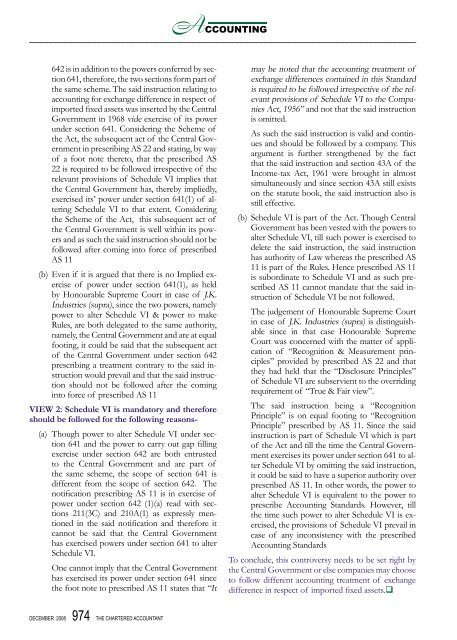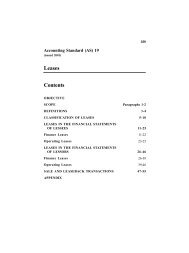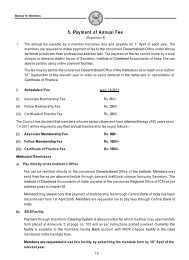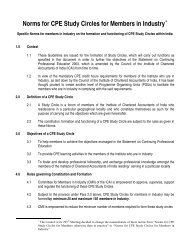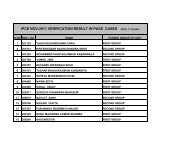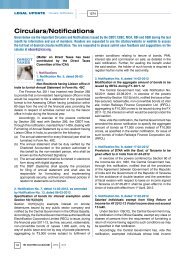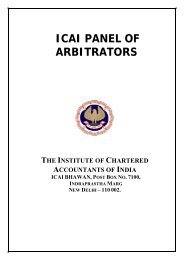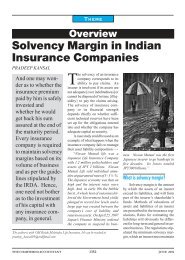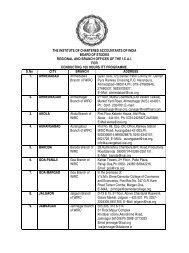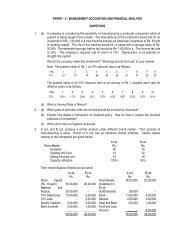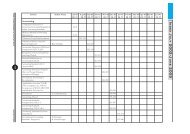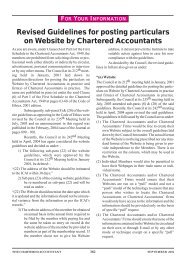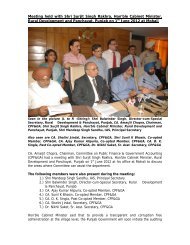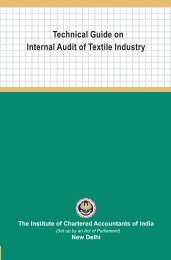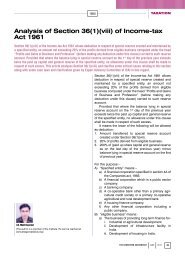The Chartered Accountant
The Chartered Accountant
The Chartered Accountant
You also want an ePaper? Increase the reach of your titles
YUMPU automatically turns print PDFs into web optimized ePapers that Google loves.
DECEMBER 2008 974 THE CHARTERED ACCOUNTANT<br />
ACCOUNTING<br />
642 is in addition to the powers conferred by section<br />
641, therefore, the two sections form part of<br />
the same scheme. <strong>The</strong> said instruction relating to<br />
accounting for exchange difference in respect of<br />
imported fixed assets was inserted by the Central<br />
Government in 1968 vide exercise of its power<br />
under section 641. Considering the Scheme of<br />
the Act, the subsequent act of the Central Government<br />
in prescribing AS 22 and stating, by way<br />
of a foot note thereto, that the prescribed AS<br />
22 is required to be followed irrespective of the<br />
relevant provisions of Schedule VI implies that<br />
the Central Government has, thereby impliedly,<br />
exercised its’ power under section 641(1) of altering<br />
Schedule VI to that extent. Considering<br />
the Scheme of the Act, this subsequent act of<br />
the Central Government is well within its powers<br />
and as such the said instruction should not be<br />
followed after coming into force of prescribed<br />
AS 11<br />
(b) Even if it is argued that there is no Implied exercise<br />
of power under section 641(1), as held<br />
by Honourable Supreme Court in case of J.K.<br />
Industries (supra), since the two powers, namely<br />
power to alter Schedule VI & power to make<br />
Rules, are both delegated to the same authority,<br />
namely, the Central Government and are at equal<br />
footing, it could be said that the subsequent act<br />
of the Central Government under section 642<br />
prescribing a treatment contrary to the said instruction<br />
would prevail and that the said instruction<br />
should not be followed after the coming<br />
into force of prescribed AS 11<br />
VIEW 2: Schedule VI is mandatory and therefore<br />
should be followed for the following reasons-<br />
(a) Though power to alter Schedule VI under section<br />
641 and the power to carry out gap filling<br />
exercise under section 642 are both entrusted<br />
to the Central Government and are part of<br />
the same scheme, the scope of section 641 is<br />
different from the scope of section 642. <strong>The</strong><br />
notification prescribing AS 11 is in exercise of<br />
power under section 642 (1)(a) read with sections<br />
211(3C) and 210A(1) as expressly mentioned<br />
in the said notification and therefore it<br />
cannot be said that the Central Government<br />
has exercised powers under section 641 to alter<br />
Schedule VI.<br />
One cannot imply that the Central Government<br />
has exercised its power under section 641 since<br />
the foot note to prescribed AS 11 states that “It<br />
may be noted that the accounting treatment of<br />
exchange differences contained in this Standard<br />
is required to be followed irrespective of the relevant<br />
provisions of Schedule VI to the Companies<br />
Act, 1956” and not that the said instruction<br />
is omitted.<br />
As such the said instruction is valid and continues<br />
and should be followed by a company. This<br />
argument is further strengthened by the fact<br />
that the said instruction and section 43A of the<br />
Income-tax Act, 1961 were brought in almost<br />
simultaneously and since section 43A still exists<br />
on the statute book, the said instruction also is<br />
still effective.<br />
(b) Schedule VI is part of the Act. Though Central<br />
Government has been vested with the powers to<br />
alter Schedule VI, till such power is exercised to<br />
delete the said instruction, the said instruction<br />
has authority of Law whereas the prescribed AS<br />
11 is part of the Rules. Hence prescribed AS 11<br />
is subordinate to Schedule VI and as such prescribed<br />
AS 11 cannot mandate that the said instruction<br />
of Schedule VI be not followed.<br />
<strong>The</strong> judgement of Honourable Supreme Court<br />
in case of J.K. Industries (supra) is distinguishable<br />
since in that case Honourable Supreme<br />
Court was concerned with the matter of application<br />
of “Recognition & Measurement principles”<br />
provided by prescribed AS 22 and that<br />
they had held that the “Disclosure Principles”<br />
of Schedule VI are subservient to the overriding<br />
requirement of “True & Fair view”.<br />
<strong>The</strong> said instruction being a “Recognition<br />
Principle” is on equal footing to “Recognition<br />
Principle” prescribed by AS 11. Since the said<br />
instruction is part of Schedule VI which is part<br />
of the Act and till the time the Central Government<br />
exercises its power under section 641 to alter<br />
Schedule VI by omitting the said instruction,<br />
it could be said to have a superior authority over<br />
prescribed AS 11. In other words, the power to<br />
alter Schedule VI is equivalent to the power to<br />
prescribe Accounting Standards. However, till<br />
the time such power to alter Schedule VI is exercised,<br />
the provisions of Schedule VI prevail in<br />
case of any inconsistency with the prescribed<br />
Accounting Standards<br />
To conclude, this controversy needs to be set right by<br />
the Central Government or else companies may choose<br />
to follow different accounting treatment of exchange<br />
difference in respect of imported fixed assets.q


